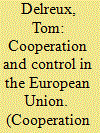|
|
|
Sort Order |
|
|
|
Items / Page
|
|
|
|
|
|
|
| Srl | Item |
| 1 |
ID:
089896


|
|
|
|
|
| Publication |
2009.
|
| Summary/Abstract |
This article examines the internal decision-making process in the European Union when the EU participates in international environmental negotiations. More particularly, the practical functioning of the relation between the member states and the EU negotiator (i.e. the Commission, the Presidency or a lead country), representing the member states externally, is examined. Starting from principal-agent theory and based on empirical research on eight EU decision-making processes with regard to international environmental negotiations, the article argues, first, that control by the member states on the EU negotiator takes place most manifestly during the course of the international negotiations, and, second, that these ad locum control mechanisms perform not only a control function, but also a cooperation function.
|
|
|
|
|
|
|
|
|
|
|
|
|
|
|
|
| 2 |
ID:
181055


|
|
|
|
|
| Summary/Abstract |
How ambitious, active and influential are countries and regional groups in global environmental negotiations? We construct eight ideal types of their roles based on ambition, activity and influence. We then examine how the roles of countries and regional groups are perceived by participants in these negotiations through a large-scale online survey. The European Union, Norway and the African Group are perceived as the most prominent reformist leaders, being highly ambitious, active and influential. On the contrary, India, the Russian Federation and many regional groups are mostly perceived as conservative bystanders, with low levels of ambition, activity and influence.
|
|
|
|
|
|
|
|
|
|
|
|
|
|
|
|
|
|
|
|
|